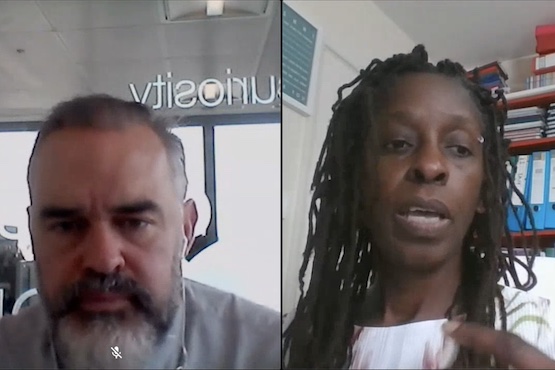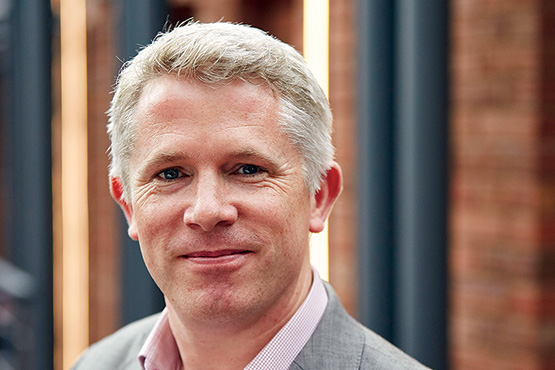ICSs need big aspirations but must tackle Covid recovery first

“I unashamedly want Dorset to be one of the best, if not the best place to live and work. That’s my aspiration, and it’s the aspiration of our Integrated Care System,” Jenni Douglas-Todd, independent chair of the Dorset ICS told the MiP’s Smaller ICSs webinar in September.
Douglas-Todd (pictured right with MiP chief executive Jon Restell) joined Gill Morgan, independent chair of the Gloucestershire ICS, for an in-depth discussion with MiP members on what the ICS reforms mean for managers, staff and patients in smaller, largely rural health and care economies.
Douglas-Todd said it was “really critical” for ICSs to have wide aspirations because “good health is reliant on everything that happens from conception to the natural end of life. That means that we have to work collectively across all of the bodies, organisations, systems, whether that be private, public sector or voluntary”.
Focusing on priorities
She described how Dorset’s initial planning work had whittled down 53 priorities to just two: post-Covid recovery and tackling health inequalities in the county.
“Many of the health inequalities and much of the deprivation in Dorset is hidden,” she explained. “That means we have to work harder to understand what the problems are. And what becomes really clear is that there’s no way the health system on its own can respond to that deprivation.”
Morgan agreed that ICSs had to focus first on recovery from the pandemic. “We’re the engine house of recovery. If we don’t get a grip on recovery in the here and now, then the longer term vision that we’re all committed to won’t happen,” she warned.
“And in the long-term, we’re really interested in how we make an impact with our local partners in making changes that create a better environment for people [in which] to be born, grow up and age well,” she continued. In between was the “really interesting zone of clinical transformation issues” – ensuring services were “best in class” and delivering them closer to people’s homes.
Subsidiarity & democratic responsibility
ICSs needed to observe “subsidiarity” by avoiding unnecessary interference in the day-to-day running of local organisations, Douglas-Todd argued, and work to “wrap our services around our people” and “bring some democratic responsibility into health”, by working with local government. “There’s an opportunity to make sure that we are accessing the voices that we find hard to hear… particularly in Dorset, where the wealthy, more educated people tend to know how to navigate the system.”
While Morgan felt “very happy” with the legislative framework for ICSs, she had concerns about the national guidance. “Everyone thinks we’re idiots who need to be told which bits to colour in… There has to be much more trust in those of us who are actually doing the business, rather than just writing guidance about the business,” she said.
While NHS partners and local authorities may share a common vision, they don’t always shared an understanding of the issues yet, Douglas-Todd explained. Describing an urgent meeting she convened recently to discuss common problems with NHS and council services in Dorset, she said: “One party was thinking it was this, and another party was thinking something else was the problem. But actually having everybody together brought a new light to the problems and a new-found energy to come up with some solutions,” she said.
Get comfortable working in partnerships
Asked her advice for someone considering a career in ICS leadership, Morgan remarked: “What we want, is people who are comfortable working in partnership. For example, in finance we have a team approach with the directors of finance from each organisation coming together to set the parameters and agree things… managing like that needs some very different skills from managing something in a traditional line organisation.”
She said larger, urban ICSs might choose “more of a top-down approach”, but in Gloucestershire “somebody who wants to work like that would probably be very uncomfortable… but that’s the only way we’re going to unleash a different level of thinking from what we’ve had before.”
- Check your regular MiP emails and the MiP website for details of further webinars on the ICS transition.
Related News
-

MiP responds to government announcement on regulating managers
Regulation is only a small piece of the jigsaw in improving standards says MiP in response to government’s announcement on senior manager regulation.
-

MiP responds to the Ten-Year Health Plan
Government must get a grip of chaotic reorganisation if NHS Ten-Year Plan is to succeed, says MiP.
-

Board-level managers given lower pay rise as new pay system kicks in
MiP has warned the government to “get senior staff on board” after executive-level NHS managers in England were given a 3.25% pay rise—lower than other health service staff.